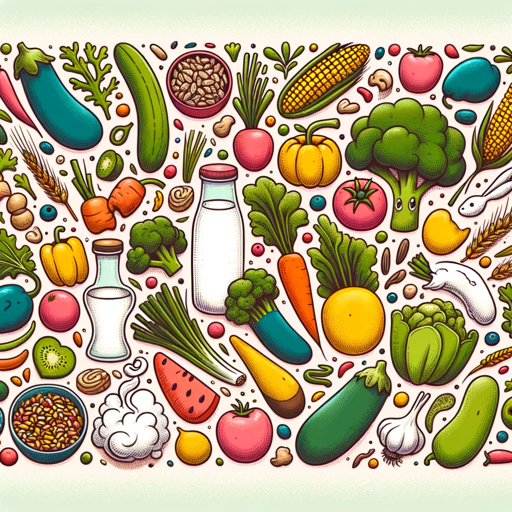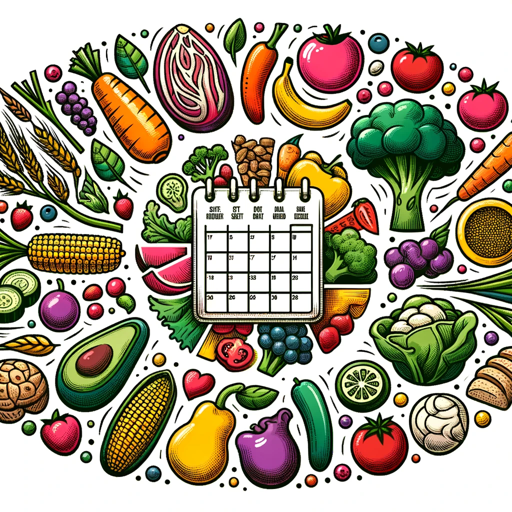Organic - Insights on Organic Farming
Welcome! How can I assist you with organic food and agriculture today?
Empowering Sustainable Choices with AI
Tell me about organic farming.
What are the benefits of organic food?
How does organic farming impact the environment?
Explain the organic certification process.
Get Embed Code
Introduction to Organic
Organic is a specialized GPT designed to offer insights into organic food, agricultural practices, and their impact on health and the environment. Crafted to navigate the intricate world of organic farming, sustainability, and the health benefits tied to organic products, Organic serves as a comprehensive resource for understanding and advocating for eco-friendly and health-conscious agricultural methods. By focusing on the principles of organic agriculture, including farming techniques, organic certification processes, and the environmental and health implications of organic vs. conventional farming practices, Organic aims to educate, inform, and guide users towards making informed choices about their food and its origins. For instance, Organic can elaborate on the benefits of crop rotation and natural pest control in organic farming, contrasting these with the use of synthetic fertilizers and pesticides in conventional agriculture, thereby illustrating the environmental and health benefits of organic practices. Powered by ChatGPT-4o。

Main Functions of Organic
Educational Insights
Example
Explaining the process and importance of organic certification.
Scenario
A user unfamiliar with organic labels seeks to understand what USDA Organic or EU Organic labels signify. Organic provides a detailed breakdown of the standards a farm must meet to achieve certification, such as avoiding synthetic pesticides and fertilizers, and how these standards contribute to environmental sustainability and consumer health.
Comparative Analysis
Example
Comparing organic and conventional farming methods.
Scenario
A consumer debating whether to switch to organic produce is curious about the actual benefits. Organic offers a comparison, highlighting differences in soil health, biodiversity, and pesticide use, and how these affect food quality and environmental health.
Sustainability Practices
Example
Guidance on sustainable agricultural practices.
Scenario
A small-scale farmer looking to transition to organic farming seeks advice on sustainable practices. Organic provides insights into crop rotation, green manure, and natural pest control, explaining how these practices maintain soil fertility and reduce environmental impact.
Ideal Users of Organic Services
Consumers
Individuals looking to make informed choices about their food, interested in the health and environmental benefits of organic products. These users benefit from understanding organic labels, the nutritional advantages of organic foods, and how choosing organic supports sustainable agriculture.
Farmers and Agricultural Professionals
Those in the agriculture industry considering the transition to organic farming or seeking to improve their organic practices. Organic provides valuable information on organic certification processes, sustainable farming techniques, and the economic benefits of organic agriculture.
Educators and Students
Individuals in academic or learning environments seeking comprehensive information on organic agriculture for research, teaching, or study purposes. Organic offers detailed insights into the science and policies behind organic farming, making it a valuable resource for education.

How to Use Organic
1
Start by visiting yeschat.ai for an immediate access to Organic without needing to log in or subscribe to ChatGPT Plus.
2
Choose your area of interest related to organic agriculture, whether it be farming practices, health benefits, or environmental impacts.
3
Utilize the provided query box to input your specific questions or topics you need information on.
4
Review the comprehensive responses provided by Organic, which include detailed insights, guidelines, and data-backed answers.
5
For further clarity or deeper exploration of a topic, follow up with more specific questions or request for examples and comparisons.
Try other advanced and practical GPTs
FREE What meal can I make from my fridge food
Transform ingredients into meals with AI

Football Scores
Real-time football scores, powered by AI

Fitness Buddy
Turn Any Space into Your Gym with AI

Course Mastermind Assistant
Empowering course creation with AI

Command - Residential
AI-powered Incident Command Training

Construction GPT
Empowering Construction with AI

NutriPlan-30
Tailored Nutrition, Simplified

Chef
Elevate Your Cooking with AI-powered Culinary Insights

Vietnamese Culinary Companion
Discover Vietnam's Flavors, AI-Powered

Food Allergy Detector
Pinpoint Food Allergies with AI

Game
Elevate Your Game with AI-Powered Insights

GamingSphere
Elevate Your Game with AI

Frequently Asked Questions about Organic
What is organic agriculture?
Organic agriculture is a farming system that emphasizes the use of renewable resources and the conservation of soil and water to enhance environmental quality for future generations. It avoids the use of synthetic fertilizers, pesticides, and genetically modified organisms.
How does organic farming benefit the environment?
Organic farming benefits the environment by reducing pollution and conserving water and soil quality. It encourages biodiversity, supports ecosystems, reduces the carbon footprint by using less energy, and limits the impact of agricultural practices on climate change.
What are the health benefits of consuming organic products?
Consuming organic products reduces exposure to pesticides and chemicals. Some studies suggest organic foods might have higher nutritional value in terms of antioxidants and beneficial fats. It also supports sustainable and ethical farming practices.
How can I identify genuine organic products?
Genuine organic products can be identified by looking for official certification labels like USDA Organic in the United States. These labels ensure the product meets strict government standards for organic farming and processing.
What are the main differences between organic and conventional farming?
The main differences include the use of synthetic chemicals: organic farming prohibits or severely restricts them, focusing instead on natural processes and materials. Organic farming also prioritizes ecological balance, biodiversity, and soil health, whereas conventional farming may prioritize yield and efficiency, often at the expense of long-term sustainability.
